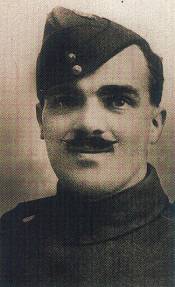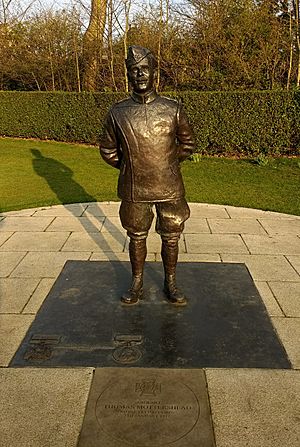Thomas Mottershead facts for kids
Quick facts for kids
Thomas Mottershead
|
|
|---|---|
 |
|
| Born | 17 January 1892 Widnes, Lancashire, England |
| Died | 12 January 1917 (aged 24) Bailleul, France |
| Buried |
Bailleul Communal Cemetery Extension
|
| Allegiance | |
| Service/ |
Royal Flying Corps |
| Years of service | 1914 - 1917 |
| Rank | Sergeant |
| Unit | No. 20 Squadron |
| Battles/wars | World War I † |
| Awards | Victoria Cross Distinguished Conduct Medal |
Thomas Mottershead was a brave English soldier. He received the Victoria Cross (VC) and the Distinguished Conduct Medal (DCM). The Victoria Cross is the highest award for bravery in the face of the enemy. It can be given to soldiers from the United Kingdom and Commonwealth countries. Thomas Mottershead was born on January 17, 1892, and sadly died on January 12, 1917, when he was 24 years old.
Contents
Early Life and Joining the War
Thomas Mottershead was born in Widnes, England. He was born on January 17, 1892. His parents were Thomas and Lucy Mottershead. He went to Widnes Technical School to study engineering. After school, he became an apprentice, learning to be a fitter and turner. This meant he learned to build and fix machines.
In February 1914, he married Lilian Medlicott Bree. They had a son named Sydney the next year. When World War I started, Thomas was working as a garage mechanic. He joined the Royal Flying Corps on August 10, 1914. The Royal Flying Corps was the air force of the British Army. He started as a mechanic. He was sent to a flying school and became a Sergeant on April 1, 1916.
In May 1916, he began training to become a pilot. He earned his Flying Certificate on June 9, 1916. He then joined No. 25 Squadron and flew an FE 2 aircraft. He took part in the Battle of the Somme.
Awarded the Distinguished Conduct Medal
One of Thomas's first missions was to bomb a German anti-aircraft gun. He flew low and successfully destroyed it. On September 22, he flew with an observer named 2nd Lieutenant C. Street. They bombed a railway station. They destroyed one train carrying ammunition and shot at another.
As they flew away, a German Fokker scout plane attacked them. Thomas used his excellent flying skills to move the plane. This allowed Street to shoot down the enemy aircraft. For this brave action and other acts of courage, Sergeant Mottershead received the Distinguished Conduct Medal. He was also promoted to Flight Sergeant.
Later, Thomas was moved to No. 20 Squadron.
Awarded the Victoria Cross
On January 7, 1917, Sergeant Mottershead was on patrol near Ploegsteert Wood, Belgium. He was flying an FE-2d plane with his observer, Lieutenant William Edward Gower. Two German Albatros D.III planes attacked them. These planes were from a German flying group called Jasta 8.
Lieutenant Gower managed to hit one of the enemy planes, taking it out of the fight. However, the second Albatros, flown by a famous German pilot named Leutnant Walter Göttsch, hit Mottershead's plane. The plane's fuel tank was hit, and the aircraft caught fire.
Flames quickly filled the cockpit. Lieutenant Gower tried to put out the fire with a small extinguisher, but he couldn't. Sergeant Mottershead was badly burned, but he bravely kept flying. He managed to guide his burning plane back to the Allied lines. He made a successful emergency landing.
When the plane landed, its landing gear broke. This threw Lieutenant Gower clear, but Thomas was trapped in the burning cockpit. He was rescued but sadly died five days later from his severe burns. He passed away in a hospital in Bailleul.
Thomas Mottershead was the only non-commissioned officer in the Royal Flying Corps to receive the Victoria Cross during World War I. King George V presented the medal to Thomas's widow, Lilian, on June 2, 1917.
Lieutenant Gower also showed great bravery. He suffered severe burns to his face. He spent eight months recovering. In May 1917, he received the Military Cross for trying to help Sergeant Mottershead. He sprayed him with the fire extinguisher, even though he was also on fire.
Memorial Concert
On April 11, 1917, the Mayor of Widnes held a concert. It was to raise money for a special fund. This fund was created to honor Sergeant T. Mottershead VC, DCM. The concert's flyer included a poem called "TRIBUTE TO 'A VERY GALLANT SOLDIER'". It was written by Amanda Bebbington.
TRIBUTE TO "A VERY GALLANT SOLDIER"
If I strove to tell this story as such story should be told,
I should write in jewel letters on a leaf of shining gold;
With a diamond pen to shrine each word as crystal as a tear,
And a blood-red fire of rubies to flash the record clear.
Oh! I cannot tell this story, for the flame is in my heart,
And my soul's afire with a vision of the mighty hero-part;
And I spill the diamonds, in tears, that blind my mortal eyes
As I dream the horror of that flight through the unpitying skies.
Oh! A nation's heart beats quicker with a proud exultant glow;
For such deeds as these can thrill her through her agony of woe.
And the England that doth render him her amplest meed of fame
Counts richest jewel in her crown her brave son's honoured name.
I leave the story all untold - too feeble are my words.
The ocean's diapason and the storm wind's thundering chords,
The very stars that strew the heavens, the suns that ceaseless roll
Shall sing and blaze the brighter since they keep that hero-soul.
(Amanda Bebbington, in the "Weekly News", 16 February 1917)
Statue in Widnes
On April 1, 2018, a statue was put up to honor Thomas Mottershead. It stands in Victoria Park in Widnes.
 | Janet Taylor Pickett |
 | Synthia Saint James |
 | Howardena Pindell |
 | Faith Ringgold |


